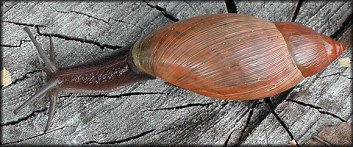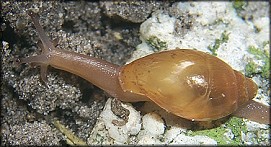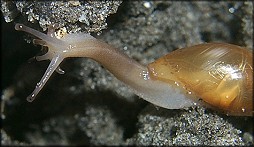| Shells Are Where You Find Them | |
| By Harry G. Lee | |
 |
|
|
|
|
| That most land mollusks are vegetarians
is common and often painfully acquired knowledge. However, a few families of
land snails have, like their marine cousins, adopted the flesh-eating habit. In
Jacksonville there exists no finer example of this carnivorous conversion than Euglandina
rosea (Férussac, 1821) – Rosy Wolfsnail. Nevertheless, this beautiful
snail usually receives the same harsh treatment at the hands of irate and
ignorant gardeners as the slugs upon which it feeds. It seems that shell
collectors, at least the writer, have also been ignorant of E. rosea’s
usefulness. Early this autumn I collected a medium-sized (55 mm.) living specimen of E. rosea along Old St. Augustine Road. After one week in alcohol the soft parts were extracted from the shell en bloc and examined. I noted the stomach was swollen, firm, and irregular. It was cut open, and out popped no less than thirteen snail shells. Many were intact, but some had been partially dissolved by digestive juices. The prey were apparently "cleaned" of their soft parts by the Euglandina and were easily identifiable as:
For years I have read of collectors such as the ambitious South Africans obtaining rare shells by searching the guts of deep-water predatory fish. After the E. rosea dissection it occurred to me that the thirteen shells would have to be logged as ex cochlea (from the snail) just as South Africans and others use ex pisce (from the fish)* for their prizes. The search for the ex cochlea shells will continue, as it is clear that E. rosea is a better snail-hunter than we humans. While the possibility of uncovering unusual shells with this technique is exciting, prospects for Afrozoila fultoni (G. B. Sowerby III, 1903) are pretty remote! *The phrase "ex pisces" is an error in syntax. Also See: Non-marine Mollusks Found In Levy, Taylor & Jackson Counties Of W. Florida |
|

